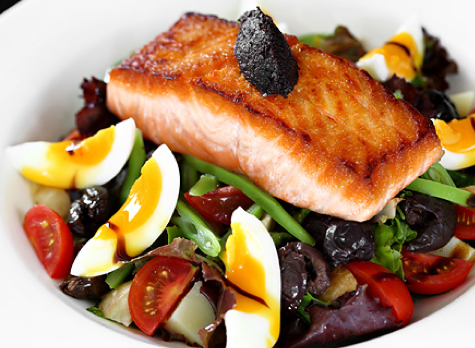
Although for many people following diets such as Atkins the weight did fall off, the diet proved too restrictive to stick to in the long term and most people had side effects such as constipation, mood swings, kidney issues, tiredness and excess body odour.
As most of us know, one of the main principles of these diets though is increasing the amount of protein in the diet and this factor has been found to be key in weight loss success – the key is to incorporate sensible amounts of protein in your diet without going to the extremes of the Atkins diet and including lots of other nutrients too – which is what we do on the Lose Baby Weight Plans.
Why is protein important?
Protein is the body’s building blocks. It forms all of our cells and is essential for the body to grow and repair itself. Protein is also used to build up muscle around the heart and to boost the immune system. Scientists have identified 22 different amino acids which make up the protein we require to stay healthy, and 13 of these are produced natural by the body. The other 9, however, need to be consumed through foods.
How much protein should I be eating if I’m trying to lose weight?
Recommendations are that adults who are not trying to lose weight should eat around 60g -80g of protein per day (see our protein table to work out how much you need) . It is estimated that up to a third of women are not hitting this daily target, and are instead boosting their calorie intakes with carbohydrates.
Proteins keep you feeling fuller for longer as they do not have the instant rush of energy associated with eating carbohydrates, especially sugars. Boosting the amount of protein in the diet can aid weight loss as you will simply not feel as hungry and therefore will be able to eat less over the course of the day.
Studies show that people who ate 30% of their daily diet in protein rich foods lost on average around 0.5kg per week without taking any other measures. Increasing protein intake is therefore a quick and easy way to help you kick start your weight loss
What foods should I be eating?
Increasing protein intake to as much as 30% of the food eaten seems daunting, but it can be easily done with a little planning. Classic foods known to be high in protein include meat, fish, seafood and eggs. The most healthy choices are lean cuts of meat without fat, white fish and skinless chicken.
Other foods high in protein include nuts, seeds, pulses and soya. Dairy products such as cheese can also be high in protein but as they have high levels of saturated fat, are not always the best choice for someone trying to lose weight so make sure you choose low fat versions.
Vegetarians who are unable to eat meat and fish can still easily increase the percentage of protein in their diets by eating more pulses, eggs and nuts. Vegans may find this more challenging, but it is still possible to lose weight while following a high protein vegan eating plan.
What would a typical day’s meals look like?
Increasing protein should be achieved by looking at a day’s meals as a whole, rather than trying to eat a whole meal just of protein. For breakfast, an ideal start would be a protein rich smoothie or some scrambled eggs, followed by a yoghurt and some fruit.
For lunch, choose something like a prawn, tuna, beef or chicken sandwich, served on whole grain bread with lots of salad and little in the way of salad dressing. For dinner, choose lean meat or fish with plenty of vegetables, salad and some rice or potatoes. Snacks shouldn’t be neglected, so choose fruit, nuts, seeds or lean meat such as ham to keep you going through the day.
To see our healthy recipes which are full of protein click here
